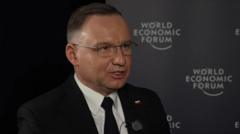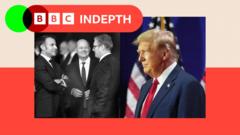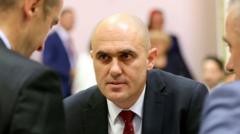Germany prepares for a new federal election as Chancellor Schulz's coalition crumbles under pressure and backlash.
Chancellor Olaf Scholz Faces Confidence Vote Defeat, Coalition on the Brink

Chancellor Olaf Scholz Faces Confidence Vote Defeat, Coalition on the Brink
Scholz's government collapses as parliamentary confidence vote signals early elections ahead.
In a dramatic turn of events, German Chancellor Olaf Scholz lost a crucial confidence vote in the Bundestag on Monday, effectively dissolving the three-party coalition he has led since 2021. The vote resulted in a decisive 394-207 outcome, with an additional 116 members abstaining—marking a significant loss for the coalition that was already deemed unpopular among voters.
The political landscape in Germany is set to shift as this vote paves the way for new federal elections, likely scheduled for February 23, 2025—seven months earlier than initially anticipated. This impending election is a direct consequence of the challenges that have beleaguered Scholz’s government, which comprised the center-left Social Democrats, the Greens, and the Free Democrats.
Scholz’s government began with promise after the 2021 elections, where the Social Democrats secured the highest number of seats but fell short of a majority. The coalition’s stability, however, was hampered by ideological rifts, especially between the economically conservative Free Democrats and their more progressive counterparts.
Initially, the coalition enjoyed decent support, but its standing deteriorated drastically after a ruling from Germany’s constitutional court barred the allocation of 60 billion euros intended for pandemic recovery. Internal disputes and damaging leaks to the media exacerbated public dissatisfaction, leading to a series of local elections this summer where all governing parties experienced losses. The situation culminated in November when Scholz dismissed Christian Lindner, the Free Democrats’ finance minister, a move perceived as a breaking point for the alliance.
As the nation anticipates the upcoming elections, questions loom over the future direction of Germany's political landscape, and whether Scholz's next successor will be better equipped to unify the country and regain public trust.
The political landscape in Germany is set to shift as this vote paves the way for new federal elections, likely scheduled for February 23, 2025—seven months earlier than initially anticipated. This impending election is a direct consequence of the challenges that have beleaguered Scholz’s government, which comprised the center-left Social Democrats, the Greens, and the Free Democrats.
Scholz’s government began with promise after the 2021 elections, where the Social Democrats secured the highest number of seats but fell short of a majority. The coalition’s stability, however, was hampered by ideological rifts, especially between the economically conservative Free Democrats and their more progressive counterparts.
Initially, the coalition enjoyed decent support, but its standing deteriorated drastically after a ruling from Germany’s constitutional court barred the allocation of 60 billion euros intended for pandemic recovery. Internal disputes and damaging leaks to the media exacerbated public dissatisfaction, leading to a series of local elections this summer where all governing parties experienced losses. The situation culminated in November when Scholz dismissed Christian Lindner, the Free Democrats’ finance minister, a move perceived as a breaking point for the alliance.
As the nation anticipates the upcoming elections, questions loom over the future direction of Germany's political landscape, and whether Scholz's next successor will be better equipped to unify the country and regain public trust.




















